Over 600 delegates gathered in San Sebastián, Spain, on 13-14 November for the European Social Economy Conference. Organised by the Spanish Ministry of Labour and Social Economy in the framework of the Spanish Presidency of the Council of the European Union, the event concluded with the adoption of a San Sebastian Manifesto, which saw 19 signatory countries recognise the key role of social economy actors.
“The social economy provides the opportunity to create decent work, generates territorial and social cohesion, promotes equality and the redistribution of benefits, reasons why it must be taken into greater consideration in all European policies,” the special commissioner of the social Economy, Víctor Meseguer, said after the signing of the manifesto.
Themed “Social Economy: People, Planet, Action”, the conference brought together a range of high-level representatives from the EU and its member states, including the European commissioner for employment and social rights, Nicolas Schmit.
Addressing the conference on the first day, Schmit argued that the social economy “guarantees innovation, prosperity, solidarity, more cohesive societies, societies that do not leave anybody behind”. He recalled how communities and societies came together during the pandemic, adding that the social economy “offers a way to better manage resilience in our society”.
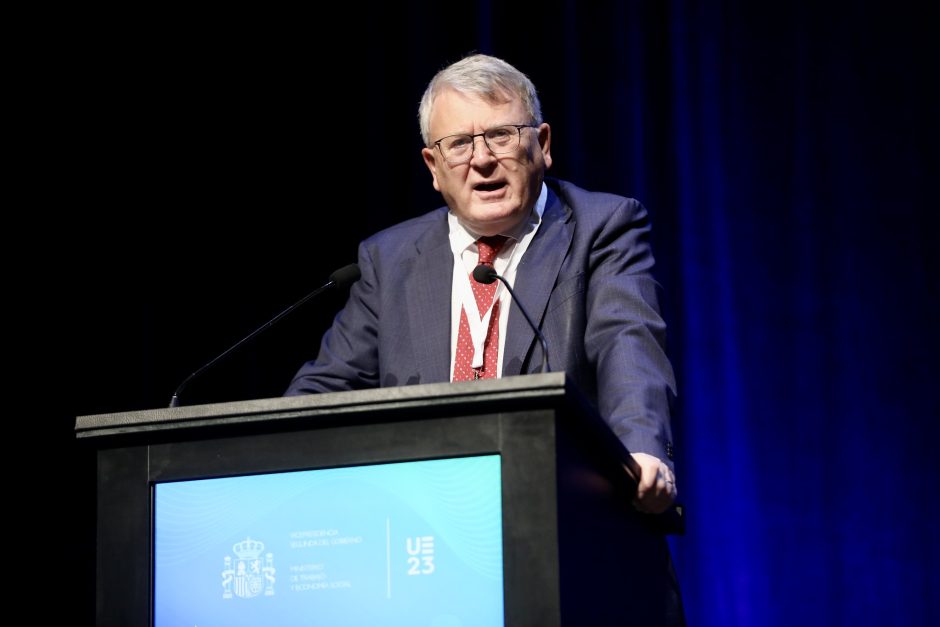
“We have been obsessed for decades by an instrument called GDP,” he said, warning that this approach is flawed and greater importance should be given the social economy – “which may not fit in this paradigm” but goes beyond the GDP because its objective is sustainability, not short-termism.
“I never believed that one day I would be scared for the future of democracy in Europe,” he said, adding that “a society where people feel abandoned and lost, and have the feeling of being left behind, is a society where democracy is in danger.”
Related: UN adopts resolution on the social and solidarity economy
Pointing to divides between countries and regions in Europe, he said the European Commission had put social economy solutions on the European agenda together with Social Economy Europe and other European Union actors. But there is still a lack of understanding of the contribution of the social economy, he warned, and more needs to be done to show how the sector can contribute to the EU’s prosperity and society’s wellbeing.
“We all have to continue working together and at all levels to ensure that the social economy becomes a solid and attractive model for everyone,” he said.
In his contribution to the first plenary, Schmit also referred to the misconception among stakeholders and some members of the public that the social economy is an economy that is dependent on public subsidies. “We need to change this perception,” he said.
The president of Social Economy Europe (SEE) and the Spanish Business Confederation of the Social Economy (CEPES), Juan Antonio Pedreño, also spoke at the opening of the event. “We are facing a unique opportunity to consolidate the business model that represents the social economy”, he said.
“The social economy is today an unquestionable reality in Europe, which represents 10% of its business fabric and 8% of its GDP. The social economy has not only adapted but is at the forefront of the main transformations of the European Union, responding to societal challenges, such as housing, energy, demographics, reindustrialisation, and the reduction of inequalities, social services and, above all, access to decent employment,” he added.
Delegates also heard from the secretary of state for employment and social economy, Joaquín Pérez Rey, who argued that “the social economy has found a leading space in Europe as it had never had before.” Pérez said the Ministry of Labor and Social Economy would continue to promote the social economy as the best tool to fight against the climate crisis, inequalities and the erosion of democracy.
Related: UN resolution calls for a second International Year of Cooperatives in 2025
Eneko Goia, the mayor of San Sebastián, which is this year’s European Social Economy Capital, mentioned the Mondragón Corporation and the GUREAK special employment centre as examples of the importance of the social economy in the region. He was echoed by the deputy minister of labor and social security of the Basque Country, Elena Pérez, who pointed out that Spain is a global reference when it comes to the social economy and the Basque country is a global reference when it comes to worker co-ops.
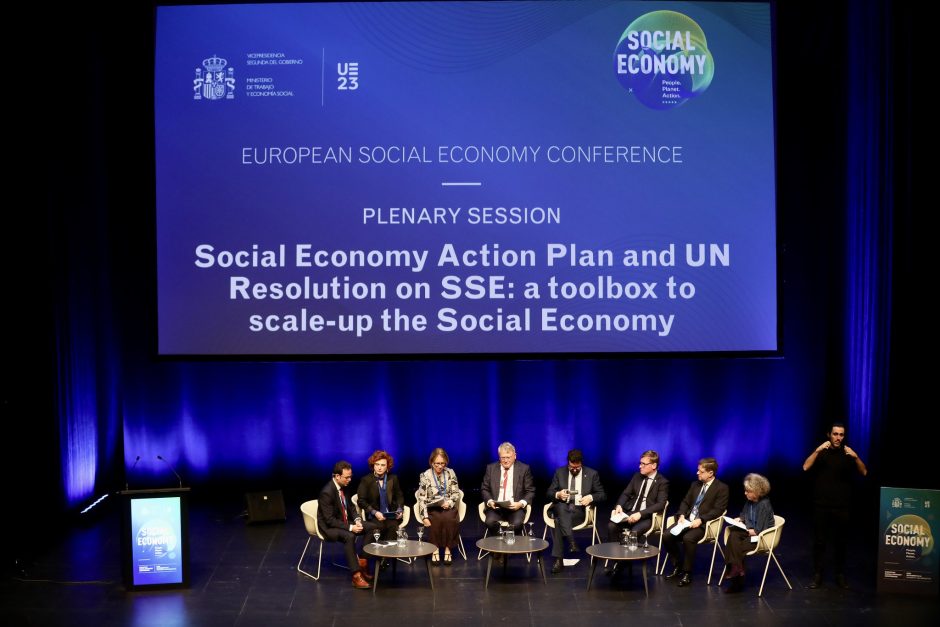
The first plenary explored the significance of the European Social Economy Action Plan and the UN Resolution on SSE as a toolbox to scale up the social economy.
Rosa Lavín, president of the Basque Social Economy Network (EGES) and of the Confederation of Cooperatives of the Basque Country (Konfekoop), highlighted the importance of the Basque social economy, and within it, the co-operative movement.
The Basque autonomous community, also known as Euskadi, is home to 1,856 co-operatives that employ more than 54,000 people. Lavín argued that to maintain these supporting ecosystems, the social economy needs supportive public policies and to be involved in decision making at the government level. She highlighted some sectors where more progress is needed, such as formalising the informal work in the care sector by using social economy models. In July the Basque government approved the Law on Co-operation and Solidarity with the aim of assuming international development agendas. In another move, the government allocated €3m towards the social economy, to support the creation of new enterprises and promote and consolidate existing ones.
The European Committee of the Regions also sees the social economy as a very important local actor that responds to the needs of communities. According to Ricardo Río, mayor of Braga and member of the European Committee of the Regions, the social economy provides jobs and services and contributes to social cohesion in communities across the EU. He also talked about the social economy’s role in fostering co-operation while facilitating the green transition. Calling for more visibility and cohesion, he argued that European funds and investment programmes must be accessible to social economy actors and said he hoped the information on EU funding would be more accessible through the Social Economy Gateway, a portal providing information for and about the social economy in Europe.
The plenary also heard from Katrin Langensiepen, vice-president of the European Parliament’s Social Economy Intergroup, who said the German government intends to work with the European Commission to improve state aid regulations for social innovation.
Similar remarks were made by Oliver Röpke, president of the European Economic and Social Committee (EESC), who argued strong social economy enterprises are key to the principle of leaving no one behind. He added that the green and digital transition can and should be at the heart of any EU recovery strategy, pointing out the potential role of social economy enterprises in the EU’s digital and green transition. He also suggested encouraging candidate EU countries to strengthen the social economy before they join the EU, including the social economy in education and training programmes at all levels, establishing an EU Erasmus scheme for people working in social economy enterprises, and re-doubling efforts to boost the role of social economy actors in the housing sector.
Mia Seppo, assistant director general for jobs and social protection at the International Labour Organization (ILO), provided an overview of the ILO’s resolution on decent work and the SSE adopted in 2022. The ILO is currently focusing on contextualising the SSE through research, including a statistical definition of the SSE.
“We are what we measure,” she said, highlighting the role of statistics on the SSE. She added that financing is key to making the ILO and UN Resolutions and the European Social Economy Action Plan a reality and pointed out that public sector procurement can help to support the sector and called on the European Commission to share examples of good practices.
Another area of improvement for the social economy is gender equality. Seppo said current data suggests the sector has strong participation and leadership of women in care education and health sector but this is not the case in other sectors like retail, finance or agriculture. “Europe should focus on this and share with the rest of the world how to ensure women and youth are not left behind,” she added.
The plenary concluded with a contribution from Joaquín Pérez, state secretary for employment and the social economy in the Spanish government, who talked about the need to incorporate social economy in day-to-day legislative and political actions. He reiterated his government’s commitment to continue incentivising the sector, including by updating the integral social economy law, a process he wants all social economy stakeholders to take part in. He also highlighted the role of the social economy in democratising enterprises and said social economy principles could be applied to empower more workers in industrial enterprises.
The opening plenary was followed by five workshops exploring different topics relevant to social economy actors. The first workshop focused on upskilling and reskilling in the workplace. The panel discussed the importance of taking into account the specificities of the social economy when it comes to the labour market, social inclusion, and training and capacity building. The speakers also explored the implications of the EU Pact for Skills, a shared engagement model for skills development in Europe and highlighted some of the biggest challenges when trying to implement such initiatives, such as access to funding or navigating the multiple platforms and tools available.
The second workshop explored how to drive the green and digital transition of the social economy. Measures suggested to support enterprises in their transition include capacity building, providing finance and non-financial assistance to SMEs, engaging in cross-national collaboration, forming clusters and collaborating across nations. The European Commission intends to develop a collaborative platform to bring all initiatives together and facilitate further collaboration.
During the third workshop participants discussed how to scale up the social economy through innovation, access to finance and access to markets. Several points were made during the session, including the need to make programmes more accessible to benefit smaller organisations as well as big ones and pay special attention to countries that still need to develop the social economy in central and eastern Europe. Panellists also pointed out that the social economy is very diverse, with different types of sectors, each facing its own challenges and needs. They added that some of these challenges can be addressed through further co-operation, co-creation, and information sharing.
The fourth workshop looked at the common values shared by the social economy and young people. The panel noted that generational change is a challenge for the agri-food sector. The speakers also mentioned the importance of access to funding as a key tool for social development as well as investment tools for the development of co-ops. They also talked about targeting social minorities and the need to give the youth a space at the table, not the corner of the table.
Panellists taking part in the fifth workshop suggested various actions to raise the visibility of the social economy. They suggested aligning national and European SE strategies; hosting conferences and events and continuing to have European capitals of the social economy; better organising the sector to ensure it delivers a coherent message and definition of the social economy; gathering statistics that go beyond quantitative data; and working closely with the academics and international organisations to sensibilise politicians to support democratic enterprises.
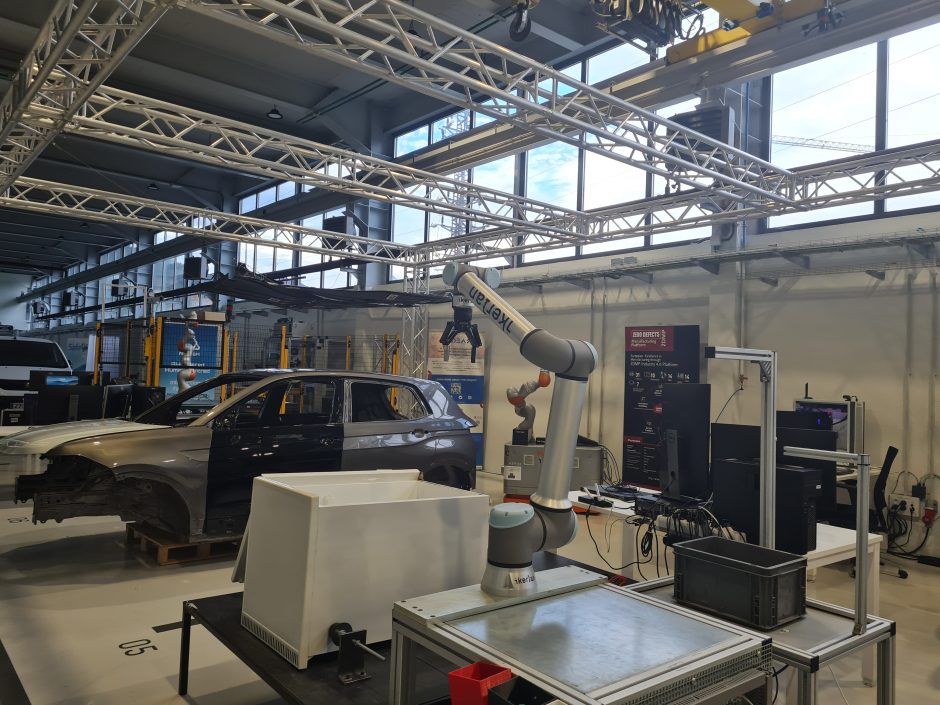
The first day of the conference continued with visits to Basque social economy enterprises and co-operatives during which delegates were able to witness the scale of the sector and its importance to the local economy. One of the co-ops visited was the Ikerlan Cooperative Research and Development Centre, which was set up in 1974 by the Mondragon Corporation to provide services to the group’s member co-ops. Until 1982, Ikerlan provided services to Mondragon co-ops only. Nowadays 50% of clients and co-ops and the other half are outside companies. Ikerlan has grown to become a pioneer of innovation in robotics, electronics, artificial intelligence and digitisation. The co-op is a member of the Mondragon Corporation and the Basque Research and Technology Alliance (BRTA). With a €28m income, Ikerlan invests €1.7m in student training. Ikerlan’s Digital Lab is the most advanced digital technology lab in Spain and one in four innovation patents in the Basque Country has the Mondragon hallmark.
During the visit, Ikerlan’s general manager, Ion Etxeberria Otadui, presented some statistics about the Mondragon Corporation. One in 10 cars has Mondragon components, 60% of the world’s trains run with parts made by Mondragon machines, and over a third of Europe’s solar panels are made using Mondragon’s technology.
The first day ended with the announcement of the Denon Artean Award and co-operative symphony concert. Awarded every two years by the Basque co-operative movement, the 2023 Denon Artean Award went to the European Commission for its role in promoting the social economy.

Commissioned by Mondragon in 2019, the Humanity at Music co-operative symphony is a result of a collaboration between composer and conductor Fernando Velázquez and writer Jon Sarasua. It tells the story of the Basque co-operative movement and was performed by the Euskadi Symphony Orchestra.
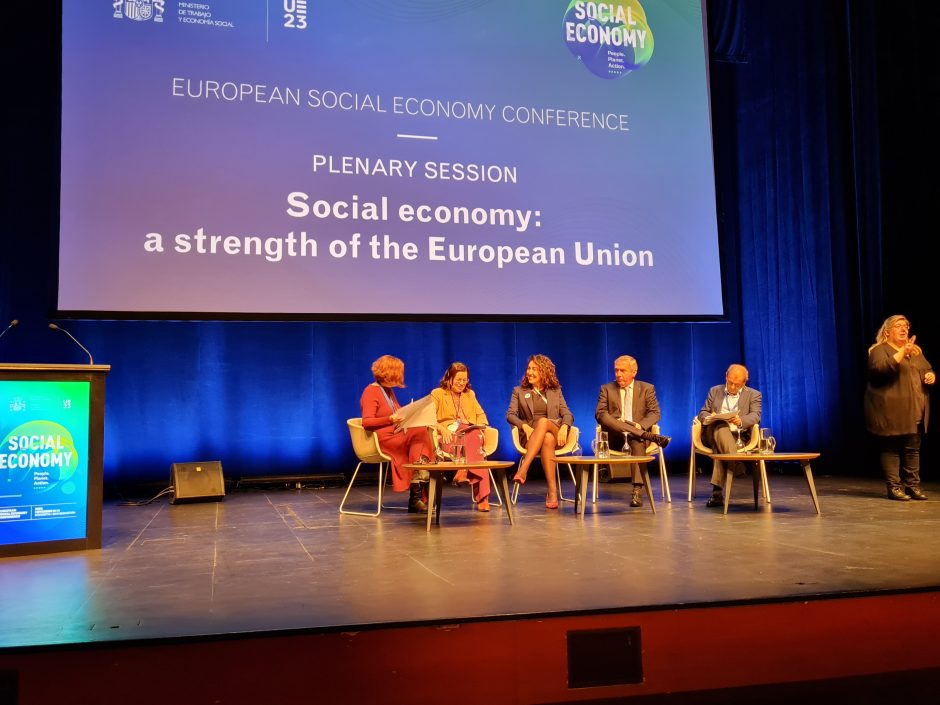
The second day started with a round-up of the workshops, followed by a plenary featuring Valentina Superti, director, Grow G – Ecosystems II: Tourism and Proximity, European Commission; Christie Morreale, vice-president of the government of Wallonia; Juan Antonio Pedreño, president of Social Economy Europe, and Iñigo Ucín, president of Mondragon.
Superti said the social economy should be a focus for the next European Commission, as part of its efforts to have “an economy that works for people”. She pointed out that there are many actors within the social economy, from co-ops and mutuals to associations and foundations. What underpins all these is a set of common values, she said, adding that this meant the social economy could be a fantastic contributor to achieving digitalisation and sustainability.
She also referred to the EU’s Transition pathways, which aim to involve all communities and stakeholders in developing the block’s industrial policy. She mentioned Mondragon as a key contributor and encouraged other social economy actors to take part in this initiative by making pledges, adding that the next deadline to submit pledges is 1 December.
The commission issues a recommendation on taxation to member states including on how it should be used with regards to the social economy. With public procurement representing 14% of the EU’s GDP, the commission will continue to explore how to drive socially responsible procurement, raise awareness and translate this into public procurement policies that are more attentive to social considerations, she said.
Morreale agreed that raising awareness remains another key challenge for the social economy. She explained how her country’s 800 social economy actors had come together under a joint initiative to launch a joint communications campaign encouraging citizens to be “unfaithful” to their regular consumption habits to support the social economy. The campaign was launched to encourage a feeling of belonging, unite the sector and make more people join social economy actors. She also mentioned the role of the social economy in driving the transition towards greener practices and the circular economy and mobilising citizens through participative processes.
Ucín described the work of Mondragon, explaining that its co-ops are based on the one member, one vote principle and the idea of solidarity. The Mondragon co-ops contribute to a solidarity fund that is used in times of crisis. Through inter-co-operation, the co-ops are able to make investments in research or selling platforms, which, in turn, enables them to compete with the largest companies. Ucín added that co-ops needed to speak with public institutions and European ones to ensure they understood the specificity of the model when it comes to regulation.
Mondragon receives over 3,000 visits a year. According to Ucín, many of the co-operators and researchers visiting are surprised to find that it is difficult to replicate its model in a different context. However, he thinks that other enterprises can apply some of Mondragon’s ideas and principles.
Pedreño pointed out that the social economy used to be looked at as a conjectural solution in situations like Covid but is now seen as a main solution to address today’s challenges. He encouraged conference participants to continue to raise awareness about the social economy.
“We talk among ourselves but we need to reach out to outsiders who are not involved in the social economy,” he said. He praised the European Parliament’s Social Economy Intergroup for its work supporting the Social Economy Action Plan adding that “it’s crucial that the next parliament maintains this group as well”.
He added that in many EU member states the social economy was only a small actor. European institutions can play a key role in encouraging national governments to boost their countries’ social economies, he said.
The conference also explored the role of the social economy in the New Urban Agenda during a plenary session with Eneko Goia, mayor of San Sebastian; Ana Umbelino, president of the European Network of Cities and Regions for the Social Economy; Pierre Hurmic, mayor of Bordeaux and President of the Global Social Economy Forum; and Antoine Dubois, responsible for SSE at the city of Strasbourg.
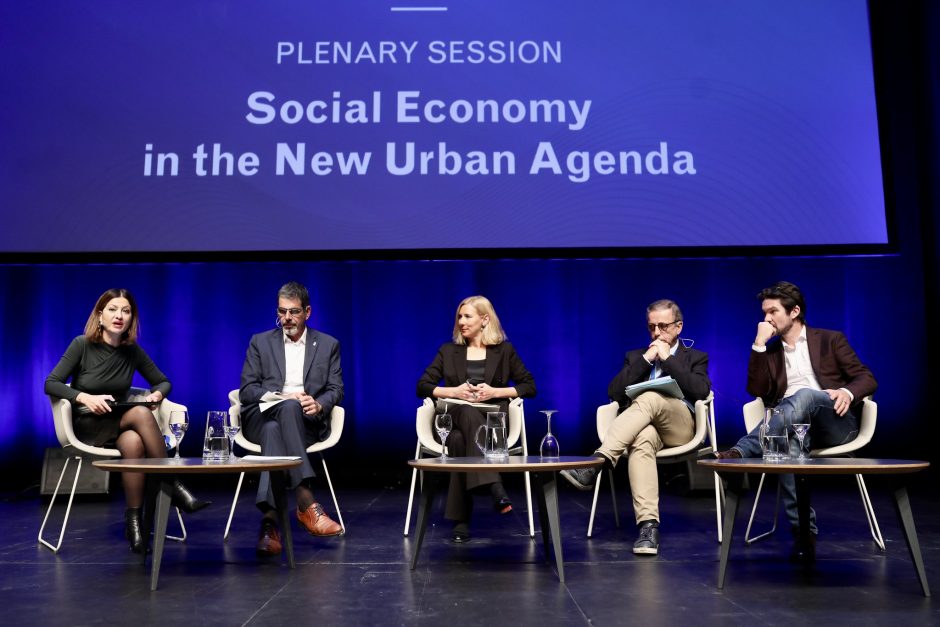
Goia referred to the contribution of social economy actors to the Basque economy, with the sector employing two million people. Half of the social economy entities are co-ops, he added.
Ombelino highlighted the role of the social economy in getting citizens involved, particularly when developing strategic planning that materialises in action-oriented documents She added that children and young people should be taught about social economy entities and local authorities could play a key role in co-creating the curricula along with social economy actors. She pointed out that certain citizens are not benefiting from some public and social services and added social economy entities could play an important role in serving these communities, working closely with local authorities.
Hurmic explained why boosting the social economy is a key area of work for the city of Bordeaux, where it generates 10% of the total employment. The metropole allocated €750,000 in direct subsidies to social economy actors in 2023, a figure it intends to maintain until 2026. Bordeaux is also presiding over the World Forum for the Solidarity Economy (GSEF) in an effort to align its policies to international initiatives.
Similar support measures are carried out in the city of Strasbourg. Dubois explained how Citiz, a co-operative car-sharing scheme, is helping residents in Strasbourg afford transport while lowering CO2 emissions.
All these issues were further explored during a final ministerial panel featuring government representatives from seven EU member states. Addressing the conference, Maxime Baduel, ministerial selegate for the SSE, France, argued the sector “is not an economy planned nationally but driven by local actors”. She said the French government aims to have stakeholders take part at all local levels. The social economy accounts for 10% of France’s GDP and 14% of jobs in the private sector. Government measures to support the sector include special financial instruments known as solidarity finance (fianance solidaire).
Morreale mentioned that Belgium would be taking over the presidency of the Council of the EU in 2024, and will aim to make progress in several areas, such as climate change, economic growth and social cohesion. She expressed support for the European Youth Entrepreneurship Academy, as a key instrument to attract young talent to the social economy and to promote the teaching of entrepreneurship via the social economy at all levels of education and training.
Romania’s secretary of state for employment and social solidarity, Madalin Cristian Vasilescu, revealed his government is currently working on a national strategy on social economy. Romania adopted its first law on social economy in 2015.
Sven Giegold, state secretary at Germany’s Ministry for Economic Affairs and Climate Action, talked about the importance of the sector in his country, where three million people are employed in the social economy, more than in the automotive industry. He added that the EU’s rules around state aid should not inhibit social economy actors and called for more statistics on the sector’s contribution. He encouraged EU member states to continue to push the European Commission to ensure all aspects of single market legislation are looked at to ensure no discrimination towards the social economy is preventing it from innovating.
Georges Engel, Luxembourg’s minister of labour, talked about his country’s ambition to diversify its economy by boosting the social economy. A qualified nurse, Engel said the social economy was his motivation for entering politics. He pledged to continue to work on raising awareness and increasing the visibility of the social economy in Luxembourg.
Ivanka Shalapatova, Bulgarian minister of labour and social policy, agreed on the challenge posed by the sector’s limited visibility but said that civil society has a huge potential yet to be unleashed. She said her government aimed to invest funding secured through the EU’s Recovery Plan and the EU Green Deal in the social economy and pledged Bulgaria’s full support for the San Sebastian manifesto. Bulgaria also chairs the the Monitoring Committee of the
Luxembourg Declaration. Adopted in 2015 by representatives of the governments of France, Italy, Luxembourg, Slovakia, Slovenia and Spain, the declaration established that the EU must reach a common understanding on the scope of the social economy which respects its enormous diversity and historical development in all member states. Shalapatova said her country would work closely with Spain and EU candidate countries to drive the social economy agenda.
Víctor Meseguer, Spain’s special commissioner for social economy, reiterated his government’s support for the social economy, revealing that over €80m would be allocated to the sector in 2023.
During the Spanish Presidency, the Council adopted the first council recommendation on framework conditions for the social economy with the aim of consolidating and strengthening the sector.
The conference concluded with the signing of the San Sebastian Manifesto. In addition to Spain, Social Economy Europe and the European Economic and Social Committee, the manifesto was signed by Germany, Austria, Belgium, Bulgaria, Croatia, Cyprus, Czech Republic, France, Greece, Italy, Latvia, Luxembourg, Netherlands, Poland, Portugal, Romania, Slovakia, Slovenia, as well as the European Social Economic Committee (EESC), the Committee of the Regions and Social Economy Europe.